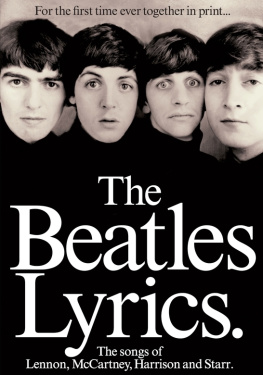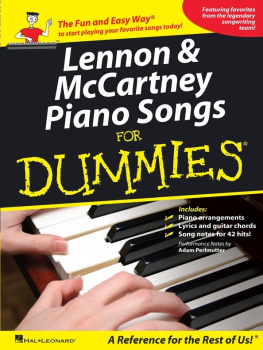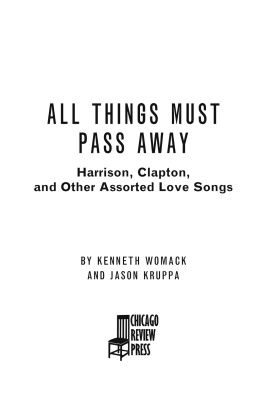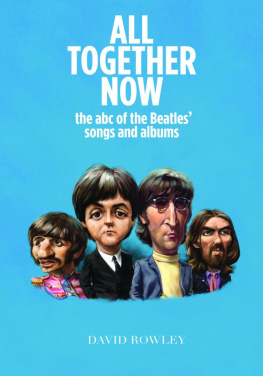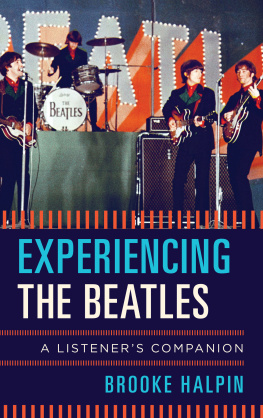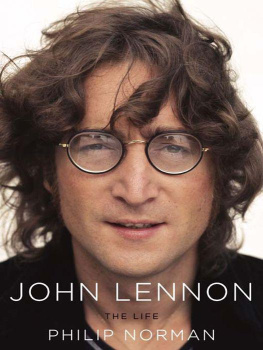WHO WROTE THE BEATLE SONGS?
A History of Lennon-McCartney
Todd M. Compton
PAHREAH PRESS
San Jose, California
Published by Pahreah Press
http://toddmcompton.com/pahreahpress.html
Copyright 2017 by Todd M. Compton. All rights reserved.
17 16 15 14 13 1 2 3 4 5
Publishers Cataloging-in-Publication data
Compton, Todd M., 1952
Who Wrote the Beatle Songs? A History of Lennon-McCartney / Todd M. Compton
p. cm.
Includes bibliographical references and index
ISBN: 978-0-9988997-0-1
ISBN: 978-0-9988997-1-8 (e-book)
1. Beatles. 2. Rock music1961-1970Analysis, appreciation. 3. Rock musicWriting and publishing. 4. Lyric writing (Popular music).
ML421.B4.C66 2017
782.4/2166/0922
Library of Congress Control Number: 2017905995
Todd M. Compton, San Jose, CA
Cover photo Press photo of The Beatles during Magical Mystery Tour
courtesy Wikimedia Commons
Table of Contents
Acknowledgments
My debts in this book are many. First, to my wife who has endured my Beatle files through the years, and was the books first reader and editor. She improved it in many ways, large and small. I would also like to thank Zach and Wes for their interest and inspiration, and for requiring me to play the White Album perhaps a million times while driving in my car. Distinguished musicologist Michael Hicks, who teaches the history of rock music at Brigham Young University, was kind enough to read parts of the book and provide a generous blurb. Lisa Fahey gave valuable graphics advice on the cover. Les Gripkey, a dedicated Beatles aficionado, was an early reader who has often provided background into the Beatles and their era in our far-ranging conversations. I appreciate Tim Compton, Tamara Hauge, Terry Harward, Tina Wilmore, Sandra Zapf, Frances Salas, Ron Kapf, Frank LaPallo, Craig Miller, Max Gaertner, Greg Dalgliesh, Alisa Tangredi, Terry Szink, Sterling Augustine, Krys Corbett, Mark Davis, Karoline Hausted, and Nancy Lim, friends at work and school who have provided help and encouragement.
All scholarship is based on previous scholarship and I should mention those debts. Mark Lewisohns massive, detailed books on the Beatles have been foundational reference works, often providing unique insights into the Beatles personalities and creativity. Walter Everetts Beatles as Musician books have been pioneering in their scholarship and depth, and Ive often worked my way back to primary sources through his exhaustive documentation. Others books that have been enormously helpful to me are Steve Turner, A Hard Days Write: The Stories Behind Every Beatle Song ; Doug Sulpy and Ray Schweighardt, Get Back: The Unauthorized Chronicle of the Beatles Let It Be Disaster ; and Richie Unterberger, The Unreleased Beatles . I should also thank Jan Wenner, Mike Hennessey, David Sheff, Joan Goodman, Miles, and many other journalists, who in interviews with Paul and John, asked the right questions that gave us all of the maddeningly contradictory evidence for the writing of the Beatle songs...
I should add that I expect readers will already know the basic story of the Beatles. If they dont, they will be well served to read some standard books on the group for more depth on biographical issues. Mark Lewisohns The Beatles Recording Sessions (1988) is my favorite book on the Beatles. His three-volume biography of the group is unfortunately not yet complete, though the first volume, The Beatles: All These Years, Volume One Tune In (2013), is magnificent. For a one-volume biography of the Beatles, the reader can do much worse than the second edition of Hunter Daviess The Beatles (1986). Ive limited my focus in this book to the Beatles songwriting, as a conscious narrowing of my narrative lens. However, Ive often been painfully aware that a number of issues I mention briefly deserve extensive treatment. I could have written chapters on Johns relationships with Cynthia Lennon and Yoko Ono, on Pauls relationships with Jane Asher and Linda McCartney. I could have easily written a chapter (or a book) on the Beatles breakup as background for the Let it Be and Abbey Road albums. Drugs impacted the Beatles, and the Beatles songs, in ways that have been viewed as positive and negative; I could have written a full chapter on that story. I should say that I find each of the Beatles utterly likeable, and flawed, at the same time. However, it was never my intention to look at these issues in depth, or to write a full biography of the Beatles. Hopefully, my book will incline future Beatle biographers to make songwriting more important in their research and longer narrative canvas.
1
INTRODUCTION
The Enigma of Lennon-McCartney
W ho wrote the Beatle songs? More specifically, who wrote the Lennon-McCartney songs? And why is the question important?
Once at a party, I was telling a friend about my views of Paul and John as individual songwriters, and about how many songs attributed to Lennon-McCartney were actually written mainly or entirely by Paul or John, and that this analysis contradicted many of the stereotypes about the two main Beatles. My friend became increasingly annoyed. Finally, he said, Okay, but one thing you have to admit. John wrote and sang Helter Skelter that hard rock masterpiece from the White Album and Paul wrote and sang Good Night the lushly orchestrated ballad that ends the White Album. My friend had just put his finger on the unrecognized complexity of Paul and John as songwriters: Paul had written and sung Helter Skelter while John had written Good Night, and had asked George Martin to orchestrate it in Hollywood style. (Ringo sang it).
As this anecdote shows, if one does not understand who wrote the Beatle songs, one can misunderstand the group pretty thoroughly. In the movie Backbeat , the writers drew on widespread stereotypes of Paul and John, portraying Paul as an ambitious, shallow entertainer, while John was the artist who loved hard rock. In keeping with this perspective, at one point they had John perform Little Richards rave-up Long Tall Sally. As Paul has pointed out, he always sang this song when the Beatles performed it. That song was his specialty. But this did not fit the bludgeon-like schematic stereotyping of Paul and John that the screenwriters drew on to create a plot and conflict for their movie.
Given the overwhelming impact the Beatles have had on popular culture in our generation, one might expect that the question, Who wrote the Beatle songs? would have an obvious, good, thorough answer. But surprisingly, it does not in part because of information and misinformation provided by the Beatles themselves (aided and abetted by their inner circle), and in part because of lack of focus on what is arguably the central contribution of the Beatles their songwriting.
Everyone but the Beatles neophyte knows that Lennon and McCartney wrote many of their songs separately. True, some songs, especially in the early Beatle period, were full collaborations, written in three hour sessions, eyeball to eyeball, as Lennon put it in a 1980 interview. Other songs were written separately by Paul or John, and then the other helped finish them with supportive collaboration. (This was the most common form of Lennon-McCartney songwriting.) At least one song, In My Life, was written by Paul adding music to Johns words (as Paul tells the story). In a few cases, Paul and John wrote entirely separate songs, or parts of songs, then stuck them together to create one finalized Beatles song (e.g., Baby Youre a Rich Man). Sometimes Paul would add a counter-melody to one of Johns songs (as in Help), and sometimes John would do the same thing for one of Pauls (as in Shes Leaving Home).
The necessary foundation for an understanding of the Beatles creativity is looking at every song separately and finding out who wrote it, and who wrote what part of it, if possible. Performance of the song is an important area of study, but is secondary to the actual songwriting. Much of the Beatles personal lives are even more secondary to the songwriting (though certainly relevant and important). The Beatles central story is a songwriting story.
Next page

